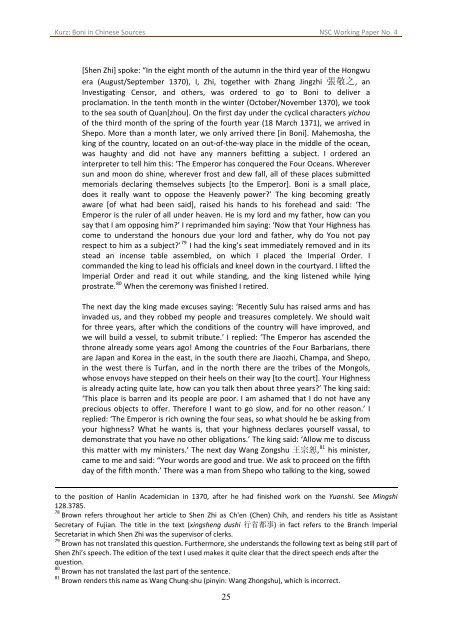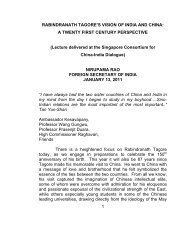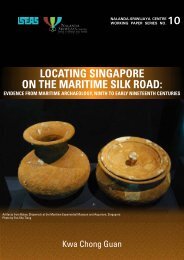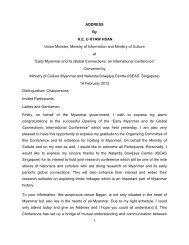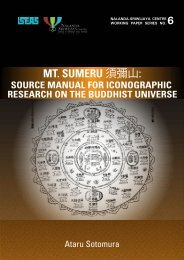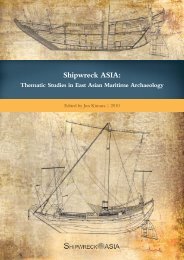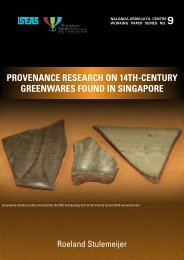Boni in Chinese Sources - Nalanda-Sriwijaya Centre - iseas
Boni in Chinese Sources - Nalanda-Sriwijaya Centre - iseas
Boni in Chinese Sources - Nalanda-Sriwijaya Centre - iseas
Create successful ePaper yourself
Turn your PDF publications into a flip-book with our unique Google optimized e-Paper software.
Kurz: <strong>Boni</strong> <strong>in</strong> Ch<strong>in</strong>ese <strong>Sources</strong> NSC Work<strong>in</strong>g Paper No. 4[Shen Zhi] spoke: “In the eight month of the autumn <strong>in</strong> the third year of the Hongwuera (August/September 1370), I, Zhi, together with Zhang J<strong>in</strong>gzhi 張 敬 之 , anInvestigat<strong>in</strong>g Censor, and others, was ordered to go to <strong>Boni</strong> to deliver aproclamation. In the tenth month <strong>in</strong> the w<strong>in</strong>ter (October/November 1370), we tookto the sea south of Quan[zhou]. On the first day under the cyclical characters yichouof the third month of the spr<strong>in</strong>g of the fourth year (18 March 1371), we arrived <strong>in</strong>Shepo. More than a month later, we only arrived there [<strong>in</strong> <strong>Boni</strong>]. Mahemosha, thek<strong>in</strong>g of the country, located on an out‐of‐the‐way place <strong>in</strong> the middle of the ocean,was haughty and did not have any manners befitt<strong>in</strong>g a subject. I ordered an<strong>in</strong>terpreter to tell him this: ‘The Emperor has conquered the Four Oceans. Whereversun and moon do sh<strong>in</strong>e, wherever frost and dew fall, all of these places submittedmemorials declar<strong>in</strong>g themselves subjects [to the Emperor]. <strong>Boni</strong> is a small place,does it really want to oppose the Heavenly power?’ The k<strong>in</strong>g becom<strong>in</strong>g greatlyaware [of what had been said], raised his hands to his forehead and said: ‘TheEmperor is the ruler of all under heaven. He is my lord and my father, how can yousay that I am oppos<strong>in</strong>g him?’ I reprimanded him say<strong>in</strong>g: ‘Now that Your Highness hascome to understand the honours due your lord and father, why do You not payrespect to him as a subject?’ 79 I had the k<strong>in</strong>g’s seat immediately removed and <strong>in</strong> itsstead an <strong>in</strong>cense table assembled, on which I placed the Imperial Order. Icommanded the k<strong>in</strong>g to lead his officials and kneel down <strong>in</strong> the courtyard. I lifted theImperial Order and read it out while stand<strong>in</strong>g, and the k<strong>in</strong>g listened while ly<strong>in</strong>gprostrate. 80 When the ceremony was f<strong>in</strong>ished I retired.The next day the k<strong>in</strong>g made excuses say<strong>in</strong>g: ‘Recently Sulu has raised arms and has<strong>in</strong>vaded us, and they robbed my people and treasures completely. We should waitfor three years, after which the conditions of the country will have improved, andwe will build a vessel, to submit tribute.’ I replied: ‘The Emperor has ascended thethrone already some years ago! Among the countries of the Four Barbarians, thereare Japan and Korea <strong>in</strong> the east, <strong>in</strong> the south there are Jiaozhi, Champa, and Shepo,<strong>in</strong> the west there is Turfan, and <strong>in</strong> the north there are the tribes of the Mongols,whose envoys have stepped on their heels on their way [to the court]. Your Highnessis already act<strong>in</strong>g quite late, how can you talk then about three years?’ The k<strong>in</strong>g said:‘This place is barren and its people are poor. I am ashamed that I do not have anyprecious objects to offer. Therefore I want to go slow, and for no other reason.’ Ireplied: ‘The Emperor is rich own<strong>in</strong>g the four seas, so what should he be ask<strong>in</strong>g fromyour highness? What he wants is, that your highness declares yourself vassal, todemonstrate that you have no other obligations.’ The k<strong>in</strong>g said: ‘Allow me to discussthis matter with my m<strong>in</strong>isters.’ The next day Wang Zongshu 王 宗 恕 , 81 his m<strong>in</strong>ister,came to me and said: “Your words are good and true. We ask to proceed on the fifthday of the fifth month.’ There was a man from Shepo who talk<strong>in</strong>g to the k<strong>in</strong>g, sowedto the position of Hanl<strong>in</strong> Academician <strong>in</strong> 1370, after he had f<strong>in</strong>ished work on the Yuanshi. See M<strong>in</strong>gshi128.3785.78 Brown refers throughout her article to Shen Zhi as Ch'en (Chen) Chih, and renders his title as AssistantSecretary of Fujian. The title <strong>in</strong> the text (x<strong>in</strong>gsheng dushi 行 省 都 事 ) <strong>in</strong> fact refers to the Branch ImperialSecretariat <strong>in</strong> which Shen Zhi was the supervisor of clerks.79 Brown has not translated this question. Furthermore, she understands the follow<strong>in</strong>g text as be<strong>in</strong>g still part ofShen Zhi’s speech. The edition of the text I used makes it quite clear that the direct speech ends after thequestion.80 Brown has not translated the last part of the sentence.81 Brown renders this name as Wang Chung‐shu (p<strong>in</strong>y<strong>in</strong>: Wang Zhongshu), which is <strong>in</strong>correct.25


